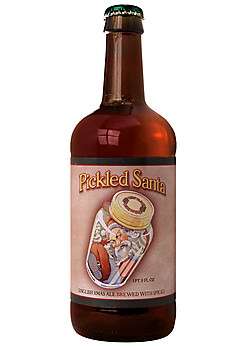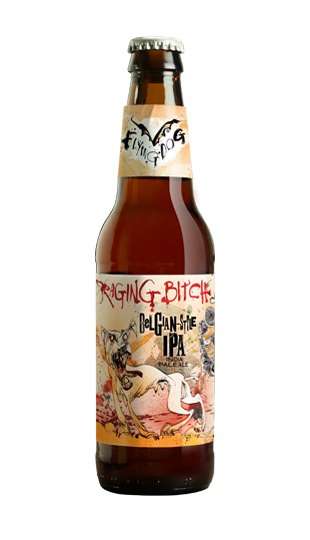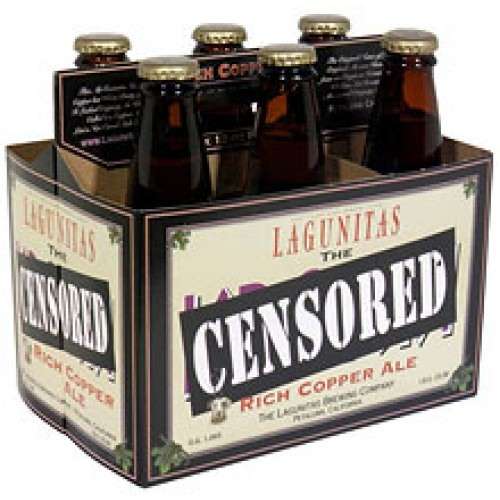Googly-Eyed Santas, Rude Frogs, and Other Adventures in Beer Label Censorship

Tim Mak collects some amusing examples of federal beer-label censorship in a Daily Beast piece about Kent "Battle" Martin, a "pedantic pain in the ass" at the Treasury Department's Tax and Trade Bureau with wide authority to decide what brewers may say about their products. A sampling of Martin's decisions:
Battle has rejected a beer label for the King of Hearts, which had a playing card image on it, because the heart implied that the beer would have a health benefit.
He rejected a beer label featuring a painting called The Conversion of Paula By Saint Jerome because its name, St. Paula's Liquid Wisdom, contained a medical claim—that the beer would grant wisdom.
He rejected a beer called Pickled Santa because Santa's eyes were too "googly" on the label, and labels cannot advertise the physical effects of alcohol. (A less googly-eyed Santa was later approved.)
He rejected a beer called Bad Elf because it featured an "Elf Warning," suggesting that elves not operate toy-making machinery while drinking the ale. The label was not approved on the grounds that the warning was confusing to consumers.

As I reported back in 1994, when beer labels were overseen by the Bureau of Alcohol, Tobacco, and Firearms (BATF), this sort of thing has been going on for many years. One of my main examples was Grant's Scottish Ale, a Washington beer that briefly came in six-packs labeled with nutritional information. The BATF found that intolerable, not because the information was inaccurate but because it was "misleading." How so? Federal alcohol regulations forbid false or misleading claims about "curative or therapeutic effects," and the BATF cited a 1954 regulatory interpretation concluding that "any reference to vitamin content in the advertising of malt beverages would mislead a substantial number of persons to believe that consumption of the product would produce curative or therapeutic effects."
After the brewery's owners went public with the dispute, the BATF started picking other fights with them. It suddenly decided that Grant's Spiced Ale, a seemingly straightforward name that the brewery had used for years, was "frivolous." Meanwhile, it gave a pass to far less descriptive names such as Labatt's Blue (which is not blue), Pete's Wicked Ale (which is not malevolent), and Blackened Voodoo (which is not seared, spiced, or magical).

The arbitrary power wielded by federal alcohol regulators stems from vague, subjective rules such as the ban on misleading claims and the ban on references to psychoactive effects (a rule that did in The Kronik, a beer that California's Lagunitas Brewery was forced to rename; it is now called, appropriately enough, Censored Ale). There is also a rule against "obscene or indecent" representations, which the BATF invoked in 1986 to force the redesign of an Italian wine label featuring an etching of a winged woman whose "upthrust and very evident" breasts had to be removed.
Worse, brewers (and manufacturers of other alcoholic beverages) have to deal with this sort of nonsense at the state level as well. In 1998 the U.S. Court of Appeals for the 2nd Circuit rebuked the New York State Liquor Authority for trying to ban Bad Frog beer, which regulators did not like because its namesake amphibian was depicted on the label "with the second of its four unwebbed 'fingers' extended in a manner evocative of a well known human gesture of insult." In 2009 the Michigan Liquor Control Commission banned Flying Dog's Raging Bitch, a Belgian-style IPA, because it did not like the name. It reversed that decision two years later after discovering this thing called the First Amendment. The Alabama Alcoholic Beverage Control Board evidently had no problem with Raging Bitch, but in 2012 it banned the sale of Founders Brewing Company's Dirty Bastard Scotch ale, even while allowing Stone Brewing's Arrogant Bastard Ale (not to mention Fat Bastard wines).
For years the Texas Alcoholic Beverage Commission (TABC) enforced a bizarre, inaccurate nomenclature for beer labels, calling malt beverages "beer" if they contained up to 4 percent alcohol by volume and "ale" if they were stronger than that. Meanwhile, it banned words that it deemed references to alcoholic content, going so far as to instruct Austin's Jester King Brewery that it could not call its strong ale (the name of a beer style) "strong." Those rules were overturned by a federal judge on First Amendment grounds in 2011. That decision, by U.S. District Judge Sam Sparks, featured this memorable passage:
TABC's argument, combined with artful legislative drafting, could be used to justify any restriction on commercial speech. For instance, Texas would likely face no (legal) obstacle if it wished to pass a law defining the word "milk" to mean "a nocturnal flying mammal that eats insects and employs echolocation." Under TABC's logic, Texas would then be authorized not only to prohibit use of the word "milk" by producers of a certain liquid dairy product, but also to require Austin promoters to advertise the famous annual "Milk Festival" on the Congress Avenue bridge [a reference to the Austin Bat Festival]. Regardless of one's feelings about milk or bats, this result is inconsistent with the guarantees of the First Amendment.
The one clear legal defeat for federal alcohol regulations came in 1995, when the Supreme Court unanimously ruled that the Treasury Department could no longer stop brewers from telling their customers how much alcohol was in their beer. Yes, that was an actual rule enforced by federal government, on the theory that beer drinkers needed to be protected from such information, lest they choose the brand that gave them the most bang for their buck. Fortunately, regulators still have the power to shield consumers from images of playing cards and googly-eyed Santas.
[Thanks to Chaz Lakip for the Daily Beast link.]


Show Comments (141)